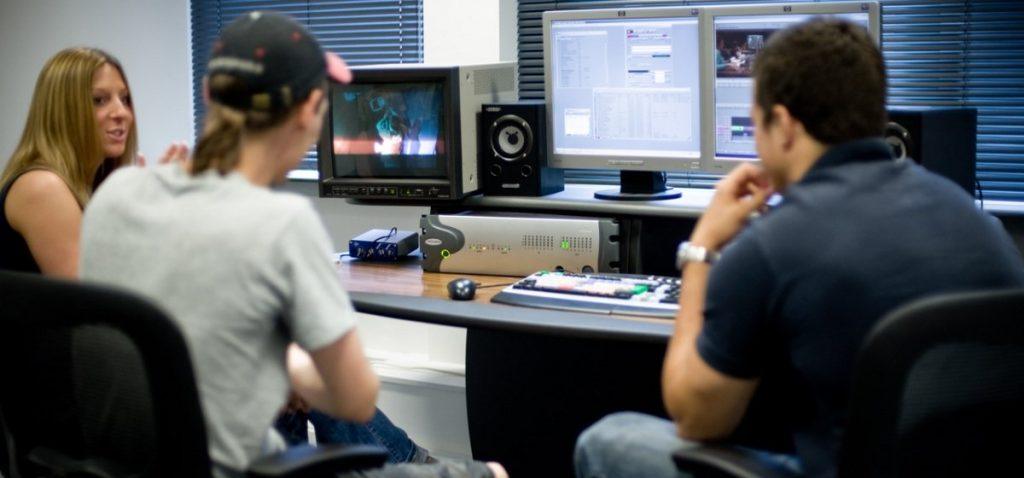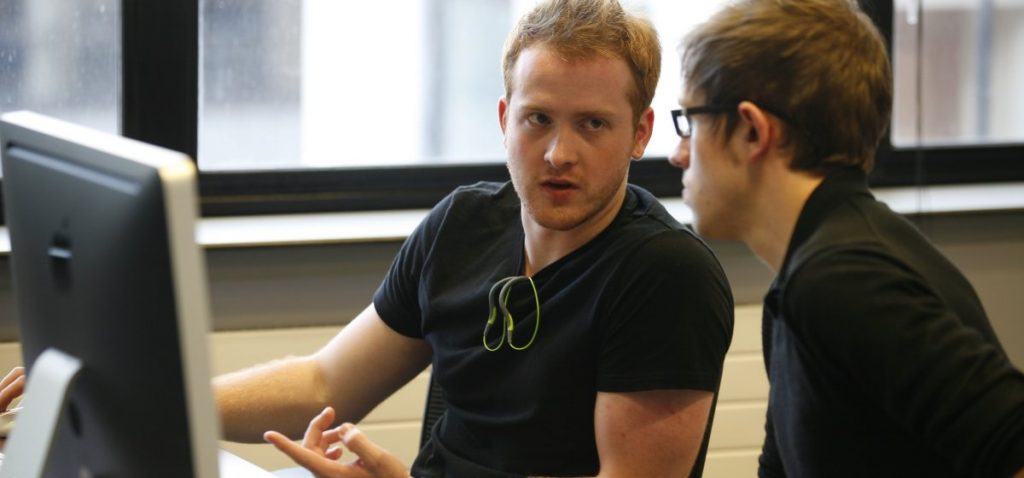Every film goes through three stages; pre-production, production and post-production. Post Production is the rewarding creative activity that can make a good film or television programme great and if you choose to work as an editor, ultimately it’s your version that hits the screen. This is the final, and often most creative stage of the process.
You will be working with various source materials, from Hollywood films, and prime-time TV, to footage you shoot yourself. Futureworks collaborates with producers throughout the country to get its students high-class broadcast standard footage in a wide range of genres. In doing this our students replicate real programmes previously shown at the cinema and on TV, giving them a perfect grounding for life in the post-production industry.
- Editing for Film
- Editing for Television
- Cameras, Lighting & Directing
- Audio Post Production
- Visual Effects
- Motion Graphics
Year 1
Post Production 1 (40 credits)
This module introduces key post-production techniques, teaching fundamental editing skills using industry-standard software. Students will learn to import, organise, and output media, understanding associated workflows. They will apply these skills in practical assessments, developing their understanding of editing theory and practice. The module lays the foundation for mastering practical, subject-specific skills with an industry-standard editing tool.
Editing for TV 1 (20 credits)
This module introduces students to short-form editing techniques in television post-production, exploring modern practices, developing research skills, and practising practical skills with widely-used video editing software. It aims to develop fundamental television post-production skills and apply them in practice.
Content Creation for Post Production (40 credits)
This module develops students’ understanding of key production, camera, and lighting techniques, enhancing their awareness of the medium and creative context. It encourages self-criticism to improve content creation and personal growth, highlighting the impact of production decisions on post-production. The course fosters creative thinking to achieve various visual styles and deepens practical knowledge in film and television through content creation for post-production.
Historical Contextual Studies (20 credits)
This module provides students with knowledge of post-production history, enhancing their ability to produce informed written discussions. It encourages group work to research and analyse specific historical aspects of post-production, leading to a research-based analysis of a selected topic. Additionally, students will develop academic writing and analytical skills.
Year 2
Audio Post Production 1 (20 credits)
This module introduces students to essential Digital Audio Workstation components and post-production audio techniques. It covers practical and theoretical aspects of digital audio, including editing, processing, mixing and using industry-standard software tools. Students will learn to creatively integrate digital audio with video footage.
Editing for TV 2 (20 credits)
This module explores different documentary and factual styles, focusing on their unique editing approaches. It will enhance students’ efficiency in editing television content, maintaining an organized workflow, and producing television-ready artefacts to near-professional standards, including various versions for broadcast delivery.
Post Production 2 (40 credits)
This module equips students with advanced post-production knowledge and techniques, enhancing their ability to apply diverse workflows to near-professional standards using industry-standard software. It also covers the transition from low-res to high-res workflows and “round-tripping” to utilise other software as part of the post-production process.
VFX for Post Production (20 credits)
This module introduces students to essential techniques in professional Post Production, teaching them to perform common visual effects tasks using industry-standard software. They will learn vital skills like tracking, rotoscoping, keying, compositing, and colour correction, and understanding the associated workflows that are required to deliver visual effects shots.
Contemporary Contextual Studies (20 credits)
This module provides an understanding of contemporary post-production, enhancing students’ confidence and knowledge through the analysis of current case studies. It explores the environmental, social context, and the structure of the post-production industry, equipping students to develop and analyse case studies. Additionally, the module facilitates the further development of academic skills.
Year 3
Honours Project (60 credits)
This module enables students to develop specialized skills in post-production, emphasizing creative thinking and research to generate project ideas. By proposing a project that students wish to undertake throughout the academic year, it encourages critical analysis of industry work and the application of research in creating their chosen project material. Students will develop a professional-standard project reflecting their style and interests, incorporating professional practices as they create an original piece of work that demonstrates their abilities, as they look towards graduation and entering the Post Production industry.
Audio Post Production (20 credits)
This module advances students’ audio post-production skills, emphasizing advanced audio/visual workflows with industry-standard software. It explores the use of professional tools for editing and exporting content in professional formats, recording techniques and even music creation. Students will learn to deliver an audio mix at a near-professional standard, master creative sound design techniques, and gain the skills to enhance their overall Post Production abilities.
Post Production 3 (40 credits)
This module requires students to demonstrate all their post-production abilities by completing a project in its entirety – from raw footage, all the way to the fully completed delivery of an artefact, ready for broadcast. Alongside testing their practical skills, students will learn about compliance and QA standards in the delivery of programmes and evaluate professional output formats to deliver content meeting industry standards. Mastering these specialist skills is essential for success in the post-production industry.
Ready to apply? No need to wait for UCAS – you can apply directly to Futureworks now!
Why Choose The Post-Production for Film and TV Degree at Futureworks?
Upon graduation, you will achieve not only a recognised degree qualification, but will also be equipped with a strong portfolio and showreel making you ready to hit the ground running on an exciting and fulfilling career.
This course, developed in consultation with industry, is designed to equip hard-working and enthusiastic individuals with the skills to succeed as post-production specialists with the ability to work as freelance editors or as part of a major production team.
We want you to become a successful post-production artist. The course reflects the fact that the modern post-production role is so much more than just editing. It is about everything that comes before, and Futureworks with its film, TV and audio departments packed full of tutors and students who are passionate about their subjects, places you in the heart of a vibrant, knowledgeable and collaborative environment.
You will find yourself working closely with other students from our other degree courses – Visual Effects, Filmmaking and Audio – on joint projects and learning from each other. It’s this outstanding integration that makes all Futureworks courses so vibrant – lots of creative and technical people all working together under one roof.
All our tutors have real world experience. Whether it’s feature film, TV documentary or corporate film experience, we only employ tutors who have worked in the industry, or in many cases, are still actively involved in real world projects. They are all professionals who have ‘been there’ and ‘done that’. These tutors also utilise their contacts as guest lecturers so the course content is always lively, exciting and highly relevant.
The links that Futureworks has with the industry mean that you will get the opportunity to work on live projects while you’re a student. We don’t do work placements. Instead you will be working as part of a team on real life jobs – they could be TV ads, short documentaries, web content or even feature films. Our partner organisations are always handing us live briefs and if you want to be a part of them, the opportunity is there for you.
In fact, Futureworks students have recently completed their own full length feature film which was financed by Futureworks and a Kickstarter campaign. More than 50 students contributed to the project under the directorship of the course leader.
This course is validated by the University of Central Lancashire (UCLan)
Your Post Production Film and TV Career Opportunities
In the area of post-production this could be as a freelance editor or post-production artist. We help you make contacts and partnerships that could last the whole of your career. Whether that’s working with independent directors, becoming associated with film production companies or working for an agency or design consultancy, the aim is the same: to help you achieve your ambition of developing a post-production career.
In today’s film industry, many roles are carried out by trusted freelancers or teams of freelancers. Therefore, Futureworks prepares students by giving them everything they need to embark on a successful and long-term freelance career.
Location & Teaching
Your primary location of study will be at our Riverside Campus, which is located on New Bailey Street in Manchester. As part of your course, some of your lessons will take place at our Futureworks Studios facility located in MediaCityUK, a few miles from the city centre.
Futureworks recognises that the skills, competencies and contribution of its staff are vital to the delivery of high quality Higher Education. All programmes are managed by a dedicated Programme Leader and team of experienced tutors, and our excellent links with industry employers mean you’ll have access to exciting guest lectures and fantastic opportunities to gain experience on real-world projects.
Applying to this Course
To be considered for this course, you will require 104-120 UCAS points.
You can apply for this course by applying directly to Futureworks. Alternatively, you can apply via the UCAS system. The UCAS codes for this course are as follows:-
UCAS Code: P313
Institution Code: F98
If you have any questions about applying for a degree course please call us on 0161 214 4602, email [email protected] or look at our Admissions page.
Successful applicants will be invited to an interview where you will have the opportunity to talk about your work, influences and interests. A guide will be sent with your interview details to help you prepare for your interview. Ideal applicants will have a keen interest in film, television, and post production. You are welcome to bring any relevant examples of work with you, if you have them. This is optional and a portfolio is not required for applications to be considered for this course.
All of our courses start in September and are full time, 3 year courses. More information on relevant dates can be found on the Term Dates page.
International Students
Futureworks is able to accept any applications from applicants who require a Student Visa (formerly called Tier 4 Visa) to study in the UK. Entry criteria for International students will vary. Please see International Students for full details.
“The tutors are all amazing and supportive. The work is thought provoking and the students are all like-minded.”
Futureworks Post Production for Film & TV BA (Hons) Student

“The post-production course is very educational. You learn a lot of different editing techniques and the assignments are fun to do. All the lecturers are really friendly and helpful when you're struggling.”
Futureworks Post Production for Film & TV BA (Hons) Student

"The connection between tutors and students is truly impeccable. As a Futureworks student, I truly believe that I am being enabled to get the most out of my uni experience. When they promoted Futureworks as an industry leader for creative arts, they were not wrong. Every week I believe I am improving as an editor and as an academic, and that is all thanks to the tutors and my fellow students."
BA (Hons) Post Production for Film & TV
Validated By



